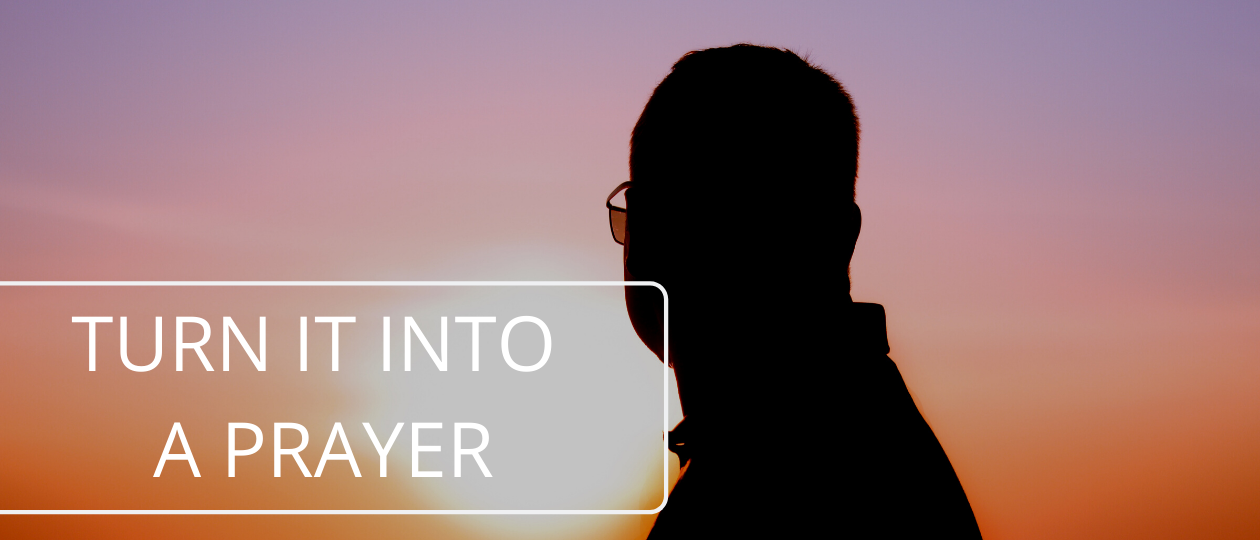Turn it into a prayer
During the years of Hope’s depression, I would occasionally hear a shout of frustration come from the living room, followed by a loud thud as her latest self-help book went sailing across it and hit the opposite wall. When I asked what was wrong, she would say, “Their advice was to ‘think positive thoughts instead of negative thought.’ Do they think I’m an idiot? Do they think I haven’t tried that a thousand times? I can’t! That’s why I’m reading these books in the first place!”
Hope is not an idiot, in fact, she’s much smarter than I am—smart enough to identify a major problem with those sorts of books. It’s the nature of depression, as well as other mental problems such as anxiety, that the majority of us cannot control them with our conscious willpower. According to my friend, Dr. Bruce Lipton, a Ph.D. and stem cell biologist who spent five years conducting research at Stanford University Medical Center, the odds of us being able to achieve something that we’ve never been able to do before through willpower alone are a million to one.
Personally, I’d say our odds might be a little better than that. Maybe even as good as a thousand to one or a hundred to one—but it’s certainly nothing you’d ever bet money on, let alone your health! Fortunately, there are better things than willpower that we can rely on, and today I’m going to share the most powerful method I know for replacing negative thoughts with positive ones.
Every so often, someone asks me what my number one recommendation is for physical, mental, and spiritual health. As far as I can recall, I’ve always given them the same answer, and it’s not Trilogy, it’s prayer. In fact, it’s more accurate to say that prayer is my number one-through-ten recommendation. Trilogy starts at about number eleven. I know that not all of you have beliefs that call for prayer, and my intention is not to preach, but I’ll tell you this. I’ve never known anyone to practice the sort of prayer I’m about to advocate for a significant period of time who didn’t benefit immensely from it, even if they didn’t believe in any higher spiritual power. With that in mind, let’s get down to business.
According to Andrew Newberg, M.D. and Mark Robert Waldman in their wonderful book, How God Changes Your Brain, prayer is by far the healthiest thing you can do for your brain, with exercise a distant second. But I’m not asking you to pray to a god you don’t believe in—if you’re not comfortable with that, you can pray to your heart, or unconscious mind, instead. It’s not as powerful in my experience, but it’s still hugely beneficial.
The most powerful form of prayer I know is authentic and ongoing. Rather than just doing it on your knees a few minutes a day, you take every negative thought that goes through your head and turn them into prayers. I recommend keeping notes for the first few days, writing down all your negative thoughts, feelings, actions, and temptations. This is to help make you more aware of them and also to force you to devote some attention to each one. Most of us have a lot more negative thoughts than positive ones, and probably a lot more than we realize. This exercise tends to be pretty frustrating at the outset, just because of the sheer volume we have to deal with, but it’s important. I think this is what Solomon the Wise meant when he talked about “taking every thought captive.”
Don’t try to censor yourself, either. If you’re upset, be upset. If the thoughts you’re turning to prayer are a steady stream of curses, then so be it. It’s not as if God doesn’t already know what you’re thinking. If you’ve ever seen Fiddler on the Roof, picture Tevya’s ongoing prayers. It wasn’t just a ritual to him, he conversed, he complained, he questioned. It was a human relationship.
Stick it out and eventually, it gets easier. Eventually, it's like your unconscious mind throws up its arms and gives in. Knowing what you'll do with the negative thoughts, it starts sending you the positive stuff instead. I find that usually takes about forty days of continuous practice, and it’s important to be consistent throughout that period. The relief and joy waiting for you is worth it.
Have a blessed, wonderful day!
Alex Loyd




Add a Comment